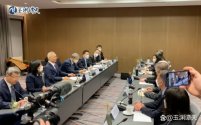You are using an out of date browser. It may not display this or other websites correctly.
You should upgrade or use an alternative browser.
You should upgrade or use an alternative browser.
Miscellaneous News
- Thread starter bd popeye
- Start date
Honestly if US ever had plans to give nukes to SK, China should straight up invade them and destroy the enrichment facilities before anything substantial can be made.
If South Korea managed to build its own nukes, then Japan is going to follow. It wouldn't be right if Japan is the only country in East Asia to not have its own nukes.
What follows would become a domino effect.
Seeing Japan getting nukes, Australia is going to be next. Once Australia has their own nukes, their regional rival, i.e. Indonesia would conclude that they should do the same and have their own nukes as well. Then what about Thailand? Saudi Arabia? Egypt? Turkey? Germany? Brazil?
The Non-Proliferation Treaty (NPT) would become nothing but a piece of toilet paper at this point. Yet, I suppose this is something that Doug Bandow would never consider, all thanks to him drowning in his own hubris, arrogance and his pockets getting lined up by the MIC.
There's no room for non-China controlled nukes on the mainland. The reason SK has been allowed to stay alive is because its a sore point where China can use NK to threaten if the west gets uppity. And because SK constantly throws wrenches in Japanese plans. If SK gets enough nukes for a credible deterrent, it would nullify any value they have.
Illegal acquisition of WMD is a legit pretext for war. And China has the firepower to blockade SK from the sea, turning it into a massive killing ground for the North's artillery and China's precision arms.
If South Korea managed to build its own nukes, then Japan is going to follow. It wouldn't be right if Japan is the only country in East Asia to not have its own nukes.
What follows would become a domino effect.
Seeing Japan getting nukes, Australia is going to be next. Once Australia has their own nukes, their regional rival, i.e. Indonesia would conclude that they should do the same and have their own nukes as well. Then what about Thailand? Saudi Arabia? Egypt? Turkey? Germany? Brazil?
The Non-Proliferation Treaty (NPT) would become nothing but a piece of toilet paper at this point. Yet, I suppose this is something that Doug Bandow would never consider, all thanks to him drowning in his own hubris, arrogance and his pockets getting lined up by the MIC.
US has war-time operational control of SK military, so I doubt US would allow SK to have it's own nuclear deterrent, because it would be incredibly redundant. SK is a defacto extension of US military, so what's the point of giving it independent launch abilities?
Even if SK re-assumes war-time control of it's own military, I doubt US would allow SK to have it's own nuclear deterrent should it would obviate the need for US-SK alliance, the biggest obstacle to reunification (particularly since China doesn't like US forces along Yalu River). SK would be even more incentivized to abandon the US-SK alliance once it acquires it's own nuclear deterrent and pursue an independent foreign policy (ie., reduced US influence, not more)
Also, why does SK need nukes when it's protected by US nuclear umbrella, and it's globally-dependent export economy would be wrecked by the global sanctions imposed on it by exiting the NPT.... US also should know proliferation can backfire with Iran, Venezuela, and other un-friendly states getting nukes following the SK example.
Pretty much. I doubt Chinese authorities would take kindly to the idea of a nuclear armed South Korea. If South Korea gets nukes then so could Iran, Venezuela, Cuba and a myriad of other countries.
If South Korea managed to build its own nukes, then Japan is going to follow. It wouldn't be right if Japan is the only country in East Asia to not have its own nukes.
What follows would become a domino effect.
Seeing Japan getting nukes, Australia is going to be next. Once Australia has their own nukes, their regional rival, i.e. Indonesia would conclude that they should do the same and have their own nukes as well. Then what about Thailand? Saudi Arabia? Egypt? Turkey? Germany? Brazil?
The Non-Proliferation Treaty (NPT) would become nothing but a piece of toilet paper at this point. Yet, I suppose this is something that Doug Bandow would never consider, all thanks to him drowning in his own hubris, arrogance and his pockets getting lined up by the MIC.
I don't see what America would gain from nuclearising South Korea other than to antagonise North Korea it would annoy even their allies in the region. It'll be much easier to use their European model where they station US missiles in Germany, Turkey and the UK under a shared use agreement.
Some of the things I've read, it's not actually a matter of manual production as in handiwork, but can be machine operatorsI'm also surprised at how manual Apple production is vs Android phones. 10x more workers is a huge difference.
1. Apple tolerances are tight
2. Non-standard sizes of anything, screws, batteries, circuit boards, etc. etc.
3. Custom machinery for small details, some things I read, one of the old MacBook Pros has an “invisible” LED cover that could not be distinguishable from the rest of the metal body. This was because Apple worked with the supplier to tune some kind of micro laser to create very fine holes that allowed the light through, but could not be seen from a distance.
So Apple customers are paying 2x-3x price for basically decorative features.Some of the things I've read, it's not actually a matter of manual production as in handiwork, but can be machine operators
1. Apple tolerances are tight
2. Non-standard sizes of anything, screws, batteries, circuit boards, etc. etc.
3. Custom machinery for small details, some things I read, one of the old MacBook Pros has an “invisible” LED cover that could not be distinguishable from the rest of the metal body. This was because Apple worked with the supplier to tune some kind of micro laser to create very fine holes that allowed the light through, but could not be seen from a distance.
They are all non-standard because Apple wants to ensure that customers cannot fix their devices when they're broken and are forced to buy a completely new device instead. That was the whole point behind the pentalobe screw, you can't fix it with a normal screwdriver. They're very well known for suing and harassing independent repair shops. The Right 2 Repair law finally put a stop to that but they've doubled down on making their devices as hard to fix as possible.Some of the things I've read, it's not actually a matter of manual production as in handiwork, but can be machine operators
1. Apple tolerances are tight
2. Non-standard sizes of anything, screws, batteries, circuit boards, etc. etc.
3. Custom machinery for small details, some things I read, one of the old MacBook Pros has an “invisible” LED cover that could not be distinguishable from the rest of the metal body. This was because Apple worked with the supplier to tune some kind of micro laser to create very fine holes that allowed the light through, but could not be seen from a distance.
I also found this regarding Yellen's summit with Liu He two days ago in Zurich. (only in Mandarin)

Roughly translated (and slightly edited) content as follows:
【#Exclusive details on the high-level talks between China and the U.S.】 On the morning of January 18, Vice Premier Liu He, the leader of the Chinese team for the China-U.S. Comprehensive Economic Dialogue, and U.S. Treasury Secretary Yellen held a half-day meeting in Zurich, Switzerland.
This is the fourth communication and first face-to-face meeting between the two in the last two years, and the first talk between China and the U.S. in 2023.
# Live transcript of the high-level talks between China and the U.S. #
Just shortly after the start of the year, what kind of signal did the talks between the two major powers of China and the United States send to the world? Lord Tan's (I think this is the news editor?) friend, Yang Chun, the head office correspondent, was on the scene, and he shared several details that are well worth savoring.
The first detail - The initiative by the U.S. side.
The venue and filming of the meeting was the responsibility of the U.S. side, and a long filming time of the meeting was allocated for the reporters, which is uncommon. Usually, the filming time given to reporters for talks of this weight is one to two minutes, but this time, from the two men shaking hands to the opening pleasantries after sitting down, the time was at least seven or eight minutes, which the reporters on the scene found very enjoyable.
The second detail - The (present) state of the two sides.
This is the first time the two sides met face-to-face, so for the first time we can see the actual state of communication between the two sides. The group photo, it speaks volumes. The Chinese side is smiling, with open arms, confidence and openness, is evident. The atmosphere of the talks between the two sides was also cordial, with a feeling of seeing each other again as old friends.
The third detail - The occasion of the talks.
The talks were held during China's participation in the Davos Forum. On the day before the talks, the Chinese side had just announced to the world that by 2023, China's economy would resume growth and reach normal levels. The Chinese side also gave a confident and frank response to the world's questions: China will not move towards a planned economy, and emphasized that it will remain open to the outside world. Openness, precisely, is also needed in Sino-US relations.
The fourth detail - Yellen did not attend the Davos Forum this time, so the main purpose of her visit to Switzerland was to meet with the Chinese side.
The theme of this year's Davos Forum is "Enhancing Cooperation in a Divided World," and in this context, it makes more sense for China and the U.S. to reach a consensus to enhance cooperation bilaterally and under multilateral frameworks such as the United Nations, G20 and APEC.
The meeting lasted about three hours and went beyond the scheduled duration, and was stopped because Yellen needed to catch a flight - Otherwise, the two sides had the will to talk for even longer.
The talks were deep, frank and pragmatic, changing the words of their writings and turning them into words of their gradualness, and the U.S. side has now made some indications.
However, there is also an interesting detail that in the group photo, Yellen is extending a hand. On some level, such a gesture is also the current situation in the United States, where there are still a lot of hesitant conservative forces within the United States. Correspondingly, it is the U.S. side who is resentful of others when itself is not in a good situation, which is precisely a state of insufficient self-confidence.
Next, the Chinese side said it welcomes the visit of U.S. Secretary of State Blinken and Yellen to China. Whether the door can open wide, (or not) what is being tested is the mentality. Regarding this mentality, the United States can ask themselves - whether they have sufficient degree of such mentality.

